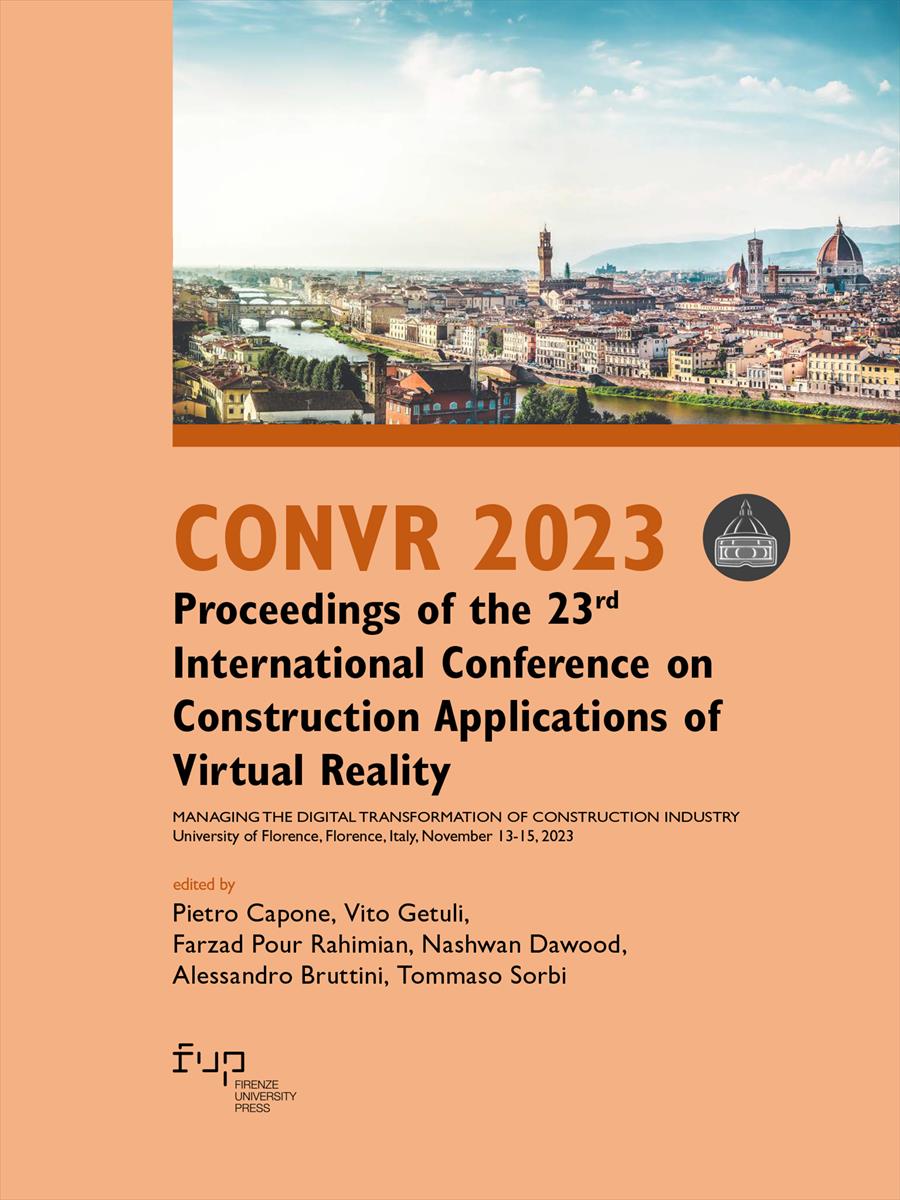- CONVR 2023 - Proceedings of the 23rd International Conference on Construction Applications of Virtual Reality
- Edited by Pietro Capone, Vito Getuli, Farzad Pour Rahimian, Nashwan Dawood, Alessandro Bruttini, Tommaso Sorbi
Investigating the Ability of Immersive Virtual Environments to Facilitate Occupant Thermal State Data Collection Involving Face Masks
- Girish Srivatsa Rentala
- Yimin Zhu
- © 2023 Author(s) |
- CC BY-NC 4.0
- DOI: 10.36253/979-12-215-0289-3.10
This study examines the capability of an immersive virtual environment (IVE–based) experimental protocol to support occupant thermal state (sensation, acceptability, and comfort) data collection when participants wear face masks. Specifically, the goal is to see if there is a change in local thermal states due to face covering and would such a change affect overall thermal states. A between-subject experiment was conducted with fifty-four participants (27 masked; 27 unmasked) who were exposed to three-step temperatures (18.3ºC, 23.8ºC, and 29.4ºC) in a climate chamber under both cooling and heating sequences. In masked IVE experiments, participants donned a face mask and viewed the chamber's virtual model on a head-mounted display. In contrast, in unmasked IVE experiments, participants didn't use a face mask. Skin temperatures and overall/local thermal state responses were collected during the experiments. They were then statistically compared between masked IVE and unmasked IVE experiments. The results suggest that forehead temperature was significantly different under all step temperatures in the cooling sequence, with mean forehead temperature being larger in masked IVE than in unmasked IVE experiments. Furthermore, in masked IVE experiments, thermal sensation in the forehead, neck, and upper-back increased while the thermal acceptability in those same skin sites decreased, but this difference was not statistically significant. Also, in masked IVE experiments, the overall thermal sensation increased, whereas both the overall thermal acceptability and comfort decreased when compared with unmasked IVE experiments. Nonetheless, this difference was not statistically significant. To summarize, wearing a face mask didn't affect the participant's overall and local thermal states in IVEs, although few statistical differences were observed in skin temperatures
- Keywords:
- Immersive virtual environment,
- thermal sensation,
- thermal comfort,
- thermal acceptability,
- face masks.,
Louisiana State University, United States - ORCID: 0000-0002-9847-4495
Louisiana State University, United States - ORCID: 0000-0002-3871-4733
- Alamirah, H., Schweiker, M., & Azar, E. (2022). Immersive virtual environments for occupant comfort and adaptive behavior research – A comprehensive review of tools and applications. Building and Environment, 207, 108396. DOI: 10.1016/j.buildenv.2021.108396
- ASHRAE. (2013). Standard 55-2013-Thermal environmental conditions for human occupancy. ASHRAE. Atlanta, USA.
- Chinazzo, G., Chamilothori, K., Wienold, J., & Andersen, M. (2020). Temperature-color interaction: Subjective indoor environmental perception and physiological responses in virtual reality. Human Factors, 63(3), 474–502. DOI: 10.1177/0018720819892383
- Heydarian, A., Pantazis, E., Carneiro, J. P., Gerber, D., & Becerik-Gerber, B. (2016). Lights, building, action: Impact of default lighting settings on occupant behaviour. Journal of Environmental Psychology, 48, 212–223. DOI: 10.1016/j.jenvp.2016.11.001
- Hu, R., Liu, J., Xie, Y., Jiao, J., Fang, Z., & Lin, B. (2022). Effects of mask wearing duration and relative humidity on thermal perception in the summer outdoor built environment. Building Simulation, 1–16. DOI: 10.1007/s12273-022-0978-9
- Lazzarino, A. I., Steptoe, A., Hamer, M., & Michie, S. (2020). Covid-19: Important potential side effects of wearing face masks that we should bear in mind. BMJ, 369. DOI: 10.1136/bmj.m2003
- Mehrfard, A., Fotouhi, J., Taylor, G., Forster, T., Navab, N., & Fuerst, B. (2019). A comparative analysis of virtual reality head-mounted display systems. ArXiv. DOI: 10.48550/arXiv.1912.02913
- Radianti, J., Majchrzak, T. A., Fromm, J., & Wohlgenannt, I. (2020). A systematic review of immersive virtual reality applications for higher education: Design elements, lessons learned, and research agenda. Computers and Education, 147, 103778. DOI: 10.1016/j.compedu.2019.103778
- Rentala, G., Zhu, Y., & Johannsen, N. M. (2021). Impact of outdoor temperature variations on thermal state in experiments using immersive virtual environment. Sustainability, 13(19), 10638. DOI: 10.3390/su131910638
- Tang, T., Zhu, Y., Zhou, X., Guo, Z., Mao, Y., Jiang, H., Fang, Z., Zheng, Z., & Chen, X. (2022). Investigation of the effects of face masks on thermal comfort in Guangzhou, China. Building and Environment, 214, 108932. DOI: 10.1016/j.buildenv.2022.108932
- Yeom, D., Choi, J.-H., & Zhu, Y. (2019). Investigation of physiological differences between immersive virtual environment and indoor environment in a building. Indoor and Built Environment, 28(1), 46–62. DOI: 10.1177/1420326X17731945
- Yoshihara, A., Dierickx, E. E., Brewer, G. J., Sekiguchi, Y., Stearns, R. L., & Casa, D. J. (2021). Effects of face mask use on objective and subjective measures of thermoregulation during exercise in the heat. Sports Health, 13(5), 463–470. 10.1177/19417381211028212.
- Zhang, R., Liu, J., Zhang, L., Lin, J., & Wu, Q. (2021). The distorted power of medical surgical masks for changing the human thermal psychology of indoor personnel in summer. Indoor Air, 31(5), 1645–1656. 10.1111/ina.12830.
Chapter Information
Chapter Title
Investigating the Ability of Immersive Virtual Environments to Facilitate Occupant Thermal State Data Collection Involving Face Masks
Authors
Girish Srivatsa Rentala, Yimin Zhu
DOI
10.36253/979-12-215-0289-3.10
Peer Reviewed
Publication Year
2023
Copyright Information
© 2023 Author(s)
Content License
Metadata License
Bibliographic Information
Book Title
CONVR 2023 - Proceedings of the 23rd International Conference on Construction Applications of Virtual Reality
Book Subtitle
Managing the Digital Transformation of Construction Industry
Editors
Pietro Capone, Vito Getuli, Farzad Pour Rahimian, Nashwan Dawood, Alessandro Bruttini, Tommaso Sorbi
Peer Reviewed
Publication Year
2023
Copyright Information
© 2023 Author(s)
Content License
Metadata License
Publisher Name
Firenze University Press
DOI
10.36253/979-12-215-0289-3
eISBN (pdf)
979-12-215-0289-3
eISBN (xml)
979-12-215-0257-2
Series Title
Proceedings e report
Series ISSN
2704-601X
Series E-ISSN
2704-5846
